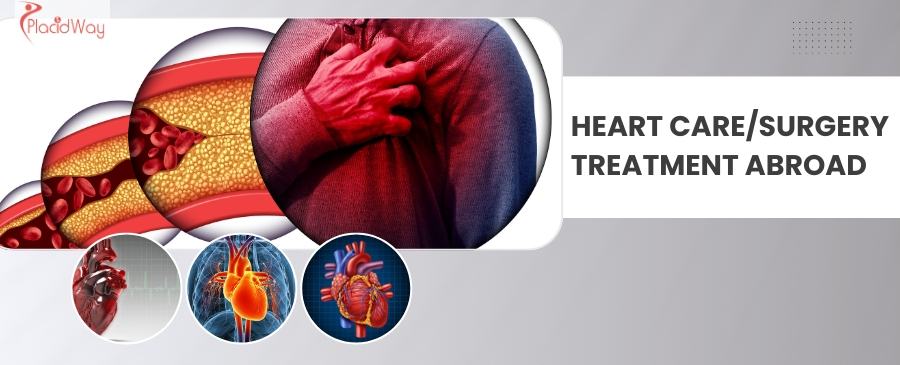Heart Care/Surgery

Table of Content
Key Insights at a Glance
- Advanced heart surgeries have high success rates and faster recovery times with specialized techniques.
- Cost savings up to 60% can be found by choosing heart care treatment abroad compared to U.S. prices.
- Minimally invasive procedures reduce scarring, with recovery periods ranging from a few days to several weeks.
- Top facilities in heart care are found in Turkey, Mexico, India, Thailand, and Colombia.
- Internationally accredited hospitals offer high-quality care and expertise, improving patient outcomes.
What is Heart Care and Surgery?
Heart care and surgery encompass a range of treatments aimed at managing and curing cardiovascular diseases, which can involve surgeries, minimally invasive procedures, lifestyle modifications, and medical management. As cardiovascular disease remains a leading global health issue, various treatments—from bypass surgery and stenting to valve replacement and minimally invasive heart repairs—are used to treat these conditions.
For patients seeking care abroad, medical tourism offers access to experienced specialists and state-of-the-art facilities at significantly reduced costs. This option is increasingly popular for complex surgeries, offering patients the chance to manage heart disease proactively and often at a more affordable price point.
Symptoms Indicating Heart Care Needs
Symptoms of cardiovascular issues can vary greatly but often include:
- Chest pain or discomfort, particularly during physical activity.
- Shortness of breath, even with minimal exertion.
- Persistent fatigue or weakness without an obvious cause.
- Palpitations or irregular heartbeats.
- Swelling in legs, ankles, or feet due to poor circulation.
These symptoms signal the need for an evaluation, which can determine the necessity for surgery or another heart care solution. Individuals experiencing these symptoms should seek medical advice promptly to prevent worsening conditions.
Latest Solutions in Heart Care and Surgery Worldwide
| Procedure | Description | Benefits |
|---|---|---|
| Coronary Artery Bypass Graft (CABG) | Restores blood flow to heart tissue by bypassing blocked arteries. | Improves blood flow, reduces angina symptoms, and enhances heart function. |
| Heart Valve Replacement | Replaces damaged heart valves with artificial or biological valves. | Improves blood circulation, reduces strain on the heart, and minimizes symptoms. |
| Minimally Invasive Heart Surgery | Performs heart surgery with small incisions, reducing recovery time. | Less scarring, quicker recovery, and reduced post-operative pain. |
| Transcatheter Aortic Valve Replacement (TAVR) | Implants a new valve without open-heart surgery, ideal for high-risk patients. | Minimizes complications, faster recovery, suitable for elderly patients. |
Safety Concerns for Heart Surgery Abroad
When opting for heart care or surgery abroad, safety concerns include:
- Clinic accreditation and certifications for adhering to international standards.
- Experience level of surgeons and clinical staff in handling complex cases.
- Language barriers and effective communication with healthcare providers.
- Post-operative care arrangements, including follow-up consultations and emergency protocols.
Ensuring a clinic’s accreditation and checking surgeon credentials are crucial for safe, successful outcomes. Pre-arranging post-operative care and understanding potential health regulations can further ease the treatment process.
Risks Associated with Heart Surgery Globally
Heart surgery abroad, while often beneficial, carries some risks that patients should consider:
- Infection at incision sites or due to medical equipment.
- Blood clot formation, leading to stroke or other complications.
- Possible anesthesia reactions or breathing issues during surgery.
- Risk of arrhythmia (irregular heart rhythms) post-surgery.
Thorough pre-operative assessments, advanced surgical techniques, and expert care can significantly reduce these risks.
Procedure Overview for Heart Surgery
| Step | Description |
|---|---|
| Pre-Operative Evaluation | Initial consultation with a cardiologist to assess heart function and determine surgery necessity. |
| Planning and Preparation | Pre-surgical instructions including dietary restrictions and exercise adjustments. |
| Surgery | The procedure, varying by type, generally lasts between 2 to 6 hours. |
| Post-Operative Care | Includes monitoring for infection, managing medications, and assessing recovery progress. |
| Follow-Up | Check-up appointments and lifestyle guidance to ensure successful recovery. |
Cost of Heart Surgery in the World | Compare Prices
Patients often find significant cost savings in other countries. Below is a comparison of average heart surgery costs worldwide:
| Country | Average Cost (USD) |
|---|---|
| Mexico | $10,000 - $20,000 |
| Turkey | $12,000 - $22,000 |
| Thailand | $15,000 - $25,000 |
| Colombia | $9,000 - $19,000 |
| India | $8,000 - $15,000 |
| Austria | $25,000 - $40,000 |
| USA | $50,000 - $80,000 |
| UK | $40,000 - $60,000 |
For more details on costs and options, explore resources on PlacidWay.
FAQs Related to Heart Surgery Internationally
What are the best countries for heart surgery abroad?
Top destinations for heart surgery abroad include Turkey, Mexico, India, and Thailand. These countries have reputable clinics and specialists offering high-quality care at competitive prices.
Is it safe to have heart surgery in another country?
Many international clinics meet high safety standards, often holding accreditations from global health organizations. Patients should research clinic credentials and surgeon qualifications before committing to any treatment abroad.
What factors affect the cost of heart surgery abroad?
The type of surgery, location, and complexity of the procedure impact costs. Pre- and post-operative care, hospital facilities, and the surgeon’s expertise also play significant roles in pricing.
How long will recovery take after heart surgery?
Recovery depends on the specific surgery performed, but most patients need 1 to 4 weeks before returning to daily activities. Comprehensive follow-up care can help speed up recovery.
Are there any lifestyle changes required after heart surgery?
Yes, lifestyle changes such as a balanced diet, regular exercise, and medication management are essential to promote heart health and prevent further complications post-surgery.
Book Your Heart Care Appointment Today with PlacidWay
Ready to explore heart care solutions abroad? PlacidWay connects you with globally accredited clinics and experienced cardiologists who can help you make the best decision for your health. From initial consultations to post-operative care, find the right treatment plan tailored to your needs.
Visit PlacidWay to book your appointment, compare costs, and access resources for high-quality heart care abroad.









